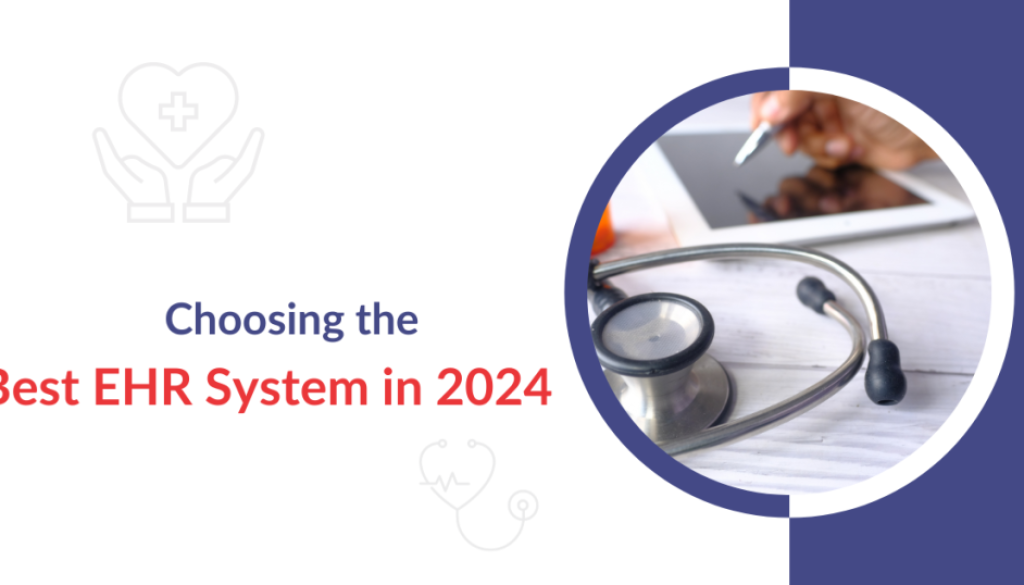Navigating the Digital Age: How to Choose the Right EHR System in 2024
Introduction
In the ever-evolving landscape of healthcare, the adoption of Electronic Health Records (EHR) systems has become paramount. These systems have revolutionized patient care and streamlined administrative processes. As we step into 2024, selecting the right EHR system for your medical practice has never been more critical. In this guide, we’ll explore why EHR systems are essential, the key benefits they offer, and how to choose the best EHR system tailored to your specific needs.
Why EHR System in Healthcare?
Before we delve into the process of selecting an EHR system, let’s understand why it’s indispensable in today’s healthcare industry.
1. Enhanced Patient Care
EHR software ensures that patient information is readily available to healthcare providers. This accessibility translates to faster and more accurate diagnoses, treatment plans, and prescription management. With an integrated EHR solution, doctors can access a patient’s complete medical history with a few clicks, leading to more informed decision-making and ultimately better patient outcomes.
2. Streamlined Workflow
Electronic Health Records software optimizes administrative tasks, reducing paperwork and enhancing efficiency. This allows healthcare professionals to focus more on patient care, improving the overall quality of healthcare services. Nurses spend less time on documentation and more time at the bedside, and physicians can see more patients with less administrative burden.
3. Interoperability
Interoperability is a buzzword in modern healthcare, and for a good reason. Integrated EHR solutions enable seamless sharing of patient data among different healthcare facilities and providers. This promotes coordinated care and reduces errors that can occur when information is siloed. Patients can receive more comprehensive care when all their providers have access to their complete medical history.
4. Data Security
In today’s digital age, data security is paramount. EHR systems come equipped with robust security features to protect sensitive patient information, ensuring HIPAA compliance and safeguarding patient privacy. The secure storage and transmission of electronic health records provide patients with peace of mind and providers with legal protection.
5. Analytics and Reporting
EHR systems provide powerful analytics tools that help medical practices identify trends, monitor patient outcomes, and make data-driven decisions for improved care. These insights can lead to more effective treatments, better resource allocation, and cost savings.
Key Benefits of EHR Solutions
Now that we understand the importance of EHR systems in healthcare, let’s explore the key benefits they offer in more detail.
Efficient Information Retrieval
One of the most significant advantages of EHR software is the efficient retrieval of patient data. In traditional paper-based systems, healthcare providers often had to sift through voluminous records to find the information they needed. With EHRs, this process is streamlined, and information can be accessed within seconds. In emergency situations, quick access to critical patient data can be a matter of life and death.
Cost Savings
EHR systems contribute to significant cost savings for medical practices in various ways. Firstly, they reduce the need for paper records, saving money on paper, printing, and storage. Secondly, by minimizing billing errors and streamlining administrative tasks, EHRs lead to better revenue cycle management, resulting in increased revenue and reduced overhead costs. Lastly, the long-term cost savings associated with improved patient care and reduced medical errors are substantial.
Customized EHR Templates
When choosing an EHR system for your practice, it’s essential to consider whether it offers customized EHR templates. These templates allow you to tailor the system to match your practice’s unique needs and workflows. For example, a pediatrician’s office might require different templates than a cardiology clinic. Customization ensures that your EHR system aligns perfectly with your specialty, further enhancing efficiency.
Patient Engagement
Some EHR systems come with patient portals, allowing patients to access their health records, schedule appointments, and communicate with their healthcare providers. This enhances patient engagement and satisfaction by giving patients more control over their healthcare experience. Patients can review lab results, request prescription refills, and securely message their doctors, fostering a sense of involvement in their care.
Regulatory Compliance
Compliance with healthcare regulations is non-negotiable. EHR software helps you stay compliant with evolving healthcare regulations, avoiding penalties and legal issues that can arise from non-compliance. Built-in compliance features ensure that your practice adheres to standards like HIPAA, protecting both your patients and your organization.
Choose the Best EHR System for Your Medical Practice
Selecting the right EHR system requires careful consideration of various factors. Here’s a step-by-step guide to help you make an informed decision:
1. Assess Your Practice’s Needs
Start by evaluating your medical practice’s unique requirements. Consider your specialty, patient volume, and workflow. Identify the specific features and functionalities you need from an EHR system. For example, a pediatric practice might prioritize growth charts and vaccination schedules, while a dermatologist might require image storage for skin conditions.
2. Budget
Determine your budget for an EHR solution. While there are affordable EMR/EHR software options available, ensure that the chosen system aligns with your financial resources. Remember that the upfront cost is just one aspect; consider long-term expenses and potential ROI when evaluating your budget.
3. Scalability
Choose an EHR system that can grow with your practice. Scalability is crucial as your patient base and services expand. You don’t want to outgrow your EHR system in a year or two, necessitating a costly migration to a more robust solution.
4. Interoperability
Check whether the EHR system can seamlessly integrate with other healthcare software, such as laboratory information systems or billing software. Interoperability is essential for smooth information exchange across the healthcare ecosystem. It ensures that your practice can collaborate effectively with other providers and share patient data when needed.
5. User-Friendliness
The EHR software should be intuitive and easy for your staff to learn and use. Complex systems can lead to frustration and reduced efficiency. Consider involving your medical staff in the selection process and gather their input on usability. Conduct thorough training to ensure that everyone is comfortable with the new system.
6. Data Security
Prioritize data security features, such as encryption, access controls, and regular security updates. Security breaches can have severe consequences, including legal liabilities and damage to your reputation. Ensure that the EHR system complies with industry standards like HIPAA to protect patient information.
7. Vendor Reputation
Research the EHR software vendor’s reputation thoroughly. Read reviews from other medical practices, ask for references, and inquire about their track record with practices similar to yours. A reputable vendor is more likely to provide a reliable and well-supported EHR system.
8. Training and Support
Ensure that the vendor provides comprehensive training and ongoing support. Your staff should feel confident in using the system effectively. Ask about the availability of customer support, response times, and the process for addressing technical issues or questions.
9. Data Migration
If you’re transitioning from paper records or switching EHR systems, consider the ease of data migration. A smooth transition is crucial to avoid disruptions in patient care and practice operations. Discuss data migration options and costs with the vendor and plan accordingly.
10. Future Upgrades
Inquire about the vendor’s plans for future upgrades and updates. You want a system that stays current with evolving healthcare technology and regulatory changes. Regular updates should include improvements to usability, security, and compliance features.
Conclusion
In 2023, the healthcare industry continues to embrace the digital revolution, and Electronic Health Records software lies at its core. Choosing the right EHR system for your medical practice is a pivotal decision that impacts patient care, practice efficiency, and your bottom line. By carefully assessing your needs, budget, and the features offered by different EHR solutions, you can make an informed choice that propels your practice into the future of healthcare, ensuring better patient outcomes and a more streamlined operation.
As you embark on this journey, remember that the right EHR system isn’t just a software solution; it’s a strategic investment in the health of your patients and the success of your practice. Take the time to evaluate your options, involve your healthcare team in the decision-making process, and choose a system that aligns with your vision for delivering high-quality, patient-centered care in the digital age. With the right EHR system in place, your medical practice will be well-equipped to navigate the challenges and opportunities of modern healthcare.



